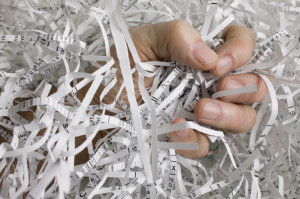 Tax season has begun, which means it’s time to start organizing paperwork–and purging files.
Tax season has begun, which means it’s time to start organizing paperwork–and purging files.
When I wrote “Easy Money” in 2007, I was this close to paperless nirvana. Our bills were paid automatically, most of our statements were electronic, and I looked forward to the day when my file cabinets would be so empty they would echo.
Something happened along the way. Paper started to creep back in as we opened new credit cards and financial accounts and failed to switch to paperless delivery. My old accountant retired, and my new accountant didn’t get the memo that we preferred everything to be electronic. Add to that all the paper that flows into your life when you have a child in school, and pretty soon my file cabinets were bulging.
A few days ago, I declared war. Thanks to my beloved ScanSnap scanner, 15-sheet cross-cut shredder and the Interwebs, we’re back on the road if not to a paper-free life, at least a paper-less life.
If you’re struggling with what to keep and what to purge, here are some important things to know:
The IRS accepts electronic records, such as downloaded bank statements and scans of receipts. A tax pro can guide you further, but there’s nothing special about a statement you receive in the mail versus one you download from a financial institution’s site (other than the fact that the mailed version can be more easily intercepted by an identity thief).
Your greatest risk of audit is in the three years after you file a tax return. The IRS can extend the audit period another three years if it suspects you under-reported your income significantly. So you’ll want to hang on to documentation for your 2013 return–the one that’s due April 15, 2014–until at least 2017 and probably until 2020. To make it easier to remember, I just subtract 7 from the current year (2014 minus 7 equals 2007) and know that I can shred the documentation for returns filed that year, and before. The tax return itself I keep (in the past as a physical document, but from now on as a scan or electronic document).
Banks and brokerages must make your statements available for at least six years. Many do so for longer (Schwab gives us access for 10 years). Credit card issuers vary, but the cards we use for business purposes–and thus would need to reference in an IRS audit–provide seven or more years’ worth of access. I shut off mail delivery of all our various retirement account statements as well. They’re online when I need them. While it’s important to keep track of the tax basis of your IRAs (any non-deductible contributions you made) to reduce your future tax bills, all your withdrawals from 401(k)s and similar plans will be taxable, so there’s no reason to hang on to the quarterly or annual statements.
There’s no point in keeping owners manuals. Almost all of them are available online…and I’m embarrassed to say I found a few manuals for electronics and appliances we no longer own. The other documents I was keeping in those files, such as receipts and warranties, can be scanned and the originals shredded.
Out with the old, in with the new. Interestingly, all of our insurers insist on sending paperwork. I scan the new policies when they arrive and then shred the previous year’s, along with any and all paid claims.
Backups are essential. I’m still astonished that some people don’t back up regularly. Our computers are backed up daily to external hard drives as well as to an online service.
How about you? Are you hanging on to paper when it’s time to let go?